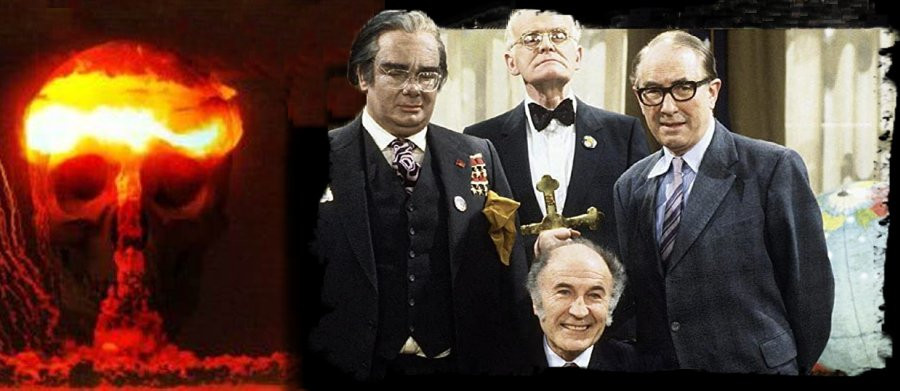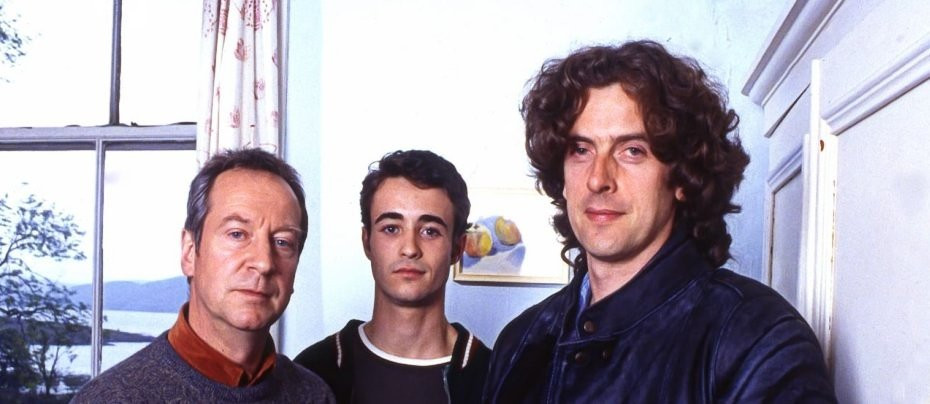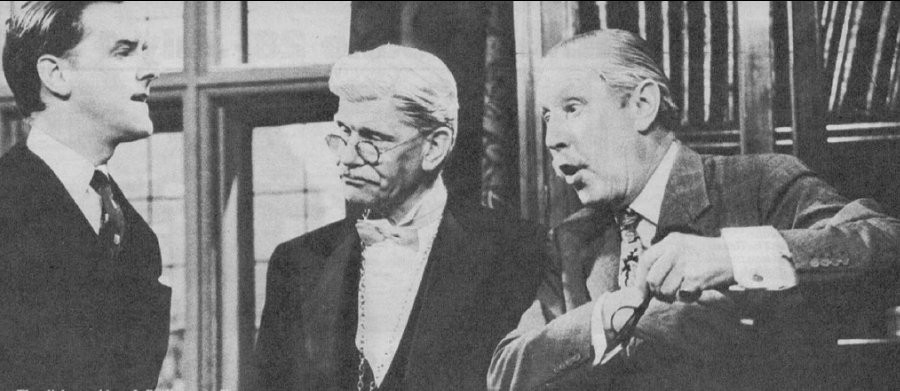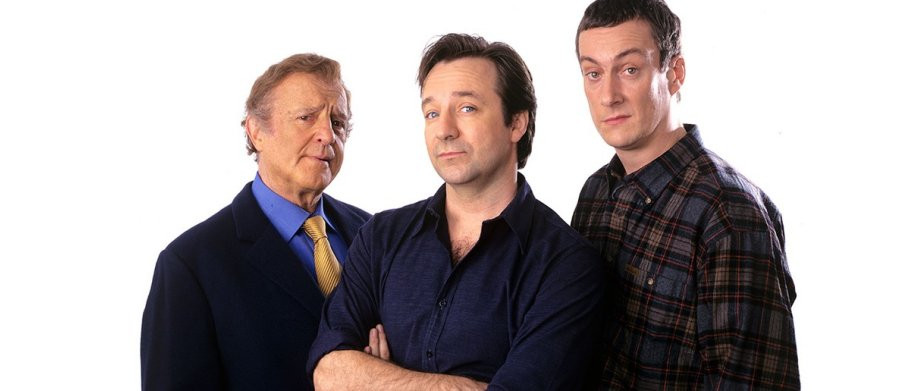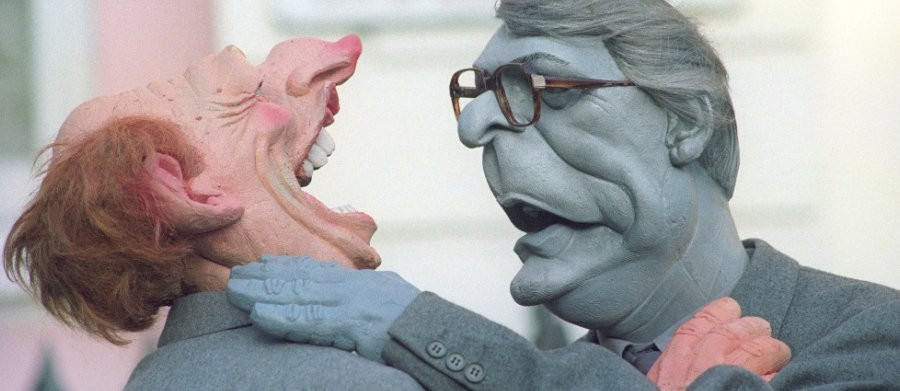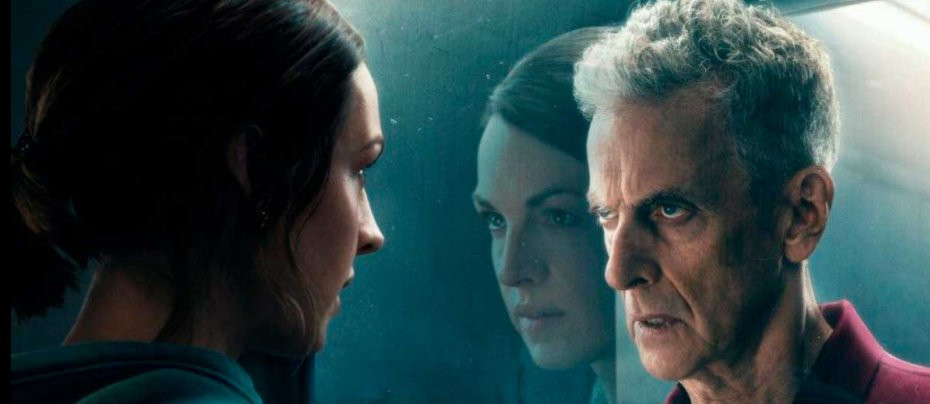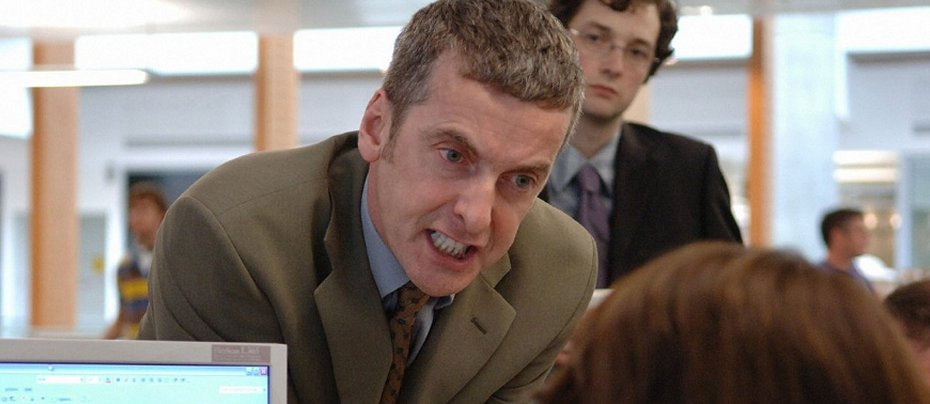
The Thick of It
2005 - United KingdomThe series moved towards the American style of comedy writing by employing a team. This included a specialist "swearing consultant.”
The Thick of It reviewed by John Winterson Richards
The problem with writing political satire for television in Britain is that Yes, Minister and its continuation Yes, Prime Minister set such a high bar. Cowriter Antony Jay, who had been a speechwriter for leading Conservative politicians and was later knighted for his political services to the Thatcher Government, brought an insider's view directly into the writing process. As a result the scripts are not only great satire but a masterclass in practical politics. Lines and concepts from the show, and the "spin off" books which mimicked the political diaries and memoirs of the time very cleverly, entered mainstream political discourse and remain there to this day.
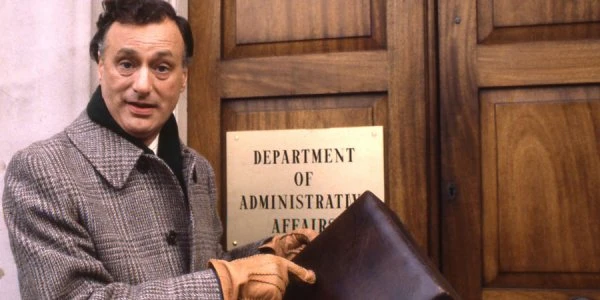
Armando Iannucci was a professed admirer. Already a very experienced, and well connected, comedy writer and radio producer for the BBC, he was the advocate for Yes, Minister in a 2004 BBC2 poll for Britain's Best Sitcom. This got him thinking of how it might be updated and his connections soon landed him a commission for a short, very cheap series for BBC4.
There was certainly scope for an update. Politics had changed fundamentally in the almost two decades since Yes, Prime Minister. In the 1980s, the focus had been on the relationship between politicians and their professional civil servants, personified respectively in Jim Hacker and Sir Humphrey Appleby in Yes, Minister. The massive electoral triumph of "New Labour" in 1997 was taken as a mandate to change absolutely everything and the new Government set out to make everything look "New."

Labour having been out of Office for eighteen years, the Prime Minister and most of his Cabinet came from a new generation without practical experience of administration - in fact they seem to have got most of their notions of Government from Yes, Minister, and the culture it satirised was one of the things they were determined to change. The idea was that a fresh and supposedly more open informality would replace stuffy old hierarchies. It became known as "Sofa Government" and, although there has since been something of a reaction against it and a return to greater formality, there was definitely a deliberate blurring of boundaries. The mutual deference of Jim Hacker and Sir Humphrey Appleby was replaced by the use of Christian names under "Call me Tony" Blair.
At the same time there was a growth in the number and influence of politically appointed "spin doctors" and "special assistants" from outside the normal civil service hierarchy. There had been such people even in the 1980s, and one was depicted in Yes, Minister - briefly, before being sidelined very efficiently by Sir Humphrey in the first episode. That would not have been credible by 2005 when Iannucci's The Thick of It first hit the small screen. The intervening period had seen a substantial increase in their influence and access to Ministers.
With that shift in power came a shift in priority. In Yes, Minister questions of policy such as Europe and nuclear weapons are discussed intelligently, if not always seriously. For all his moral weaknesses, Hacker believes sincerely in what he is trying to do. In The Thick of It policy seems almost incidental, at best a means to an end, which is feeding the 24-hour news cycle.
So while the Minister's most important relationships in Yes, Minister are with his senior civil servants, in The Thick of It they are with their political advisers and media specialists. This means that there is a huge difference in tone and style between the two projects.

Which is the more accurate? Those who served as Ministers around when Yes, Minister was first shown tend to say it is of course exaggerated for comic effect but not that far out. Those who have served more recently are understandably more reluctant to say that The Thick of It reflects their own working practices but admit some things ring true. There is general agreement that neither fully reflects the reality of the life of a working politician because depicting some of the most important elements, especially their work in Parliament, would be beyond the budget of a normal television show.
It is interesting to note that some storylines of The Thick of It which seemed unlikely at the time have since been played out in public. Whether this is because The Thick of It was prescient or because politicians, like children, tend to copy what they see on television may be a matter of debate. It does seem to be the case that The Thick of It has influenced the Post-Blair generation in much the same way as Yes, Minister influenced the Blair generation. For example, the word "omnishambles" which became a staple of political debate at one point in the 2010s was first used a few years previously in an episode of The Thick of It.
Where the scripts for Yes, Minister were produced in the traditional British "sitcom" style by a pair of writers, Iannucci moved towards the American style by employing a team. This included a specialist "swearing consultant." He also encouraged the actors to improvise. Peter Capaldi estimated that about 80% of the dialogue was scripted, the rest "ad lib." This certainly gives The Thick of It an air of realism but there are few of the beautifully crafted lines that make Yes, Minister so quotable even now.
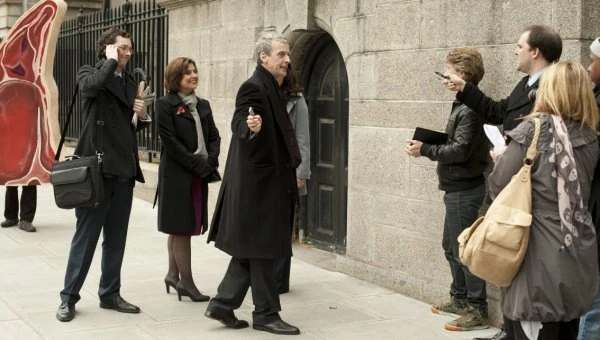
There is also a paradox with such studied "realism" - it is not really that realistic. Do people at the very top of Government - who have got there by learning to control their emotions and choose their words with care - generally swear and rant as much as they do in The Thick of It? At the time many were shocked at the bad language and thought it unlikely that national leaders could be so lacking in self discipline. This may be part of the reason that The Thick of It, while it became compulsory viewing in political circles, was not a huge hit and never entered the national consciousness as Yes, Minister did. Since then the public has become more cynical as more examples of unstatesmanlike conduct and language at the highest levels have been revealed, but, again, one wonders if this is the subsequent influence of The Thick of It rather than the show reflecting what was true at the time.
Certainly it has to be said that at no other time would some of the things said and done in The Thick of It be likely at the top of Government. Before the 1990s people at that level were generally too well mannered while since the 2010s the twin threats of "Human Resources" and litigation have made everyone a lot more careful about how they conduct themselves in the workplace.

So the "break out" character, Malcolm Tucker, is a creature of a particular time and place. Based, very loosely, on "Call me Tony" Blair's media enforcer Alastair Campbell - basically Mr. Nasty to Blair's Mr. Nice - Tucker is played without restraint by Peter Capaldi, who seems to be enjoying himself enormously.
It should be emphasised that The Thick of It was explicitly not a satire on Blair or Blairism or the "New Labour" project - no one in television had the courage or the will at the time to try to do what The New Statesman had done to the Conservatives under John Major. Like Yes, Minister, the satire was on the system, not a particular party, and the political affiliations of the characters are never mentioned explicitly. Nevertheless, it is clear that the first three seasons are referencing the Government of the time, which was Labour, and the two special episodes are referencing the then current transition between Blair and Gordon Brown. The fourth and final season, made after a Liberal-Conservative Coalition took over, assumes a similar uneasy coalition of two unnamed parties.

Although Tucker, the Prime Minister 's Director of Communications, dominates whenever he appears, he is not our main protagonist. This is, nominally, the Secretary of State at the fictional Department of Social Affairs. In the first two seasons he was played by the talented Chris Langham. Following Langham's legal problems - let us say no more than that - a new Secretary of State played by the even better Rebecca Front was appointed. In the fourth season, following the fictional and real life change of Government, a character played by Roger Allam, becomes Secretary of State while Front's character is elected Leader of the Opposition.
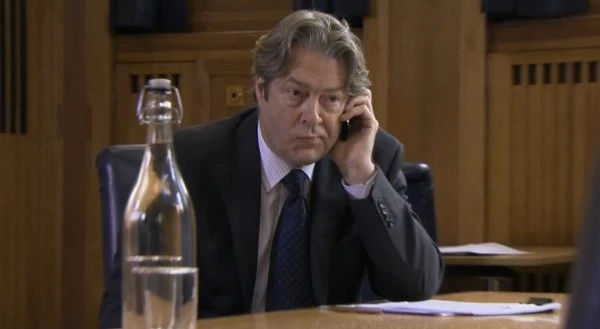
James Smith plays the Langham character's friend and senior adviser, while Chris Addison plays a "special adviser" so junior it seems amazing that he has anything useful to advise about anything. At first it seems he may be a young innocent with whom we are meant to be sympathizing, but he turns out to be as seedy and unscrupulous as anyone. It is Joanna Scanlan as the Director of Communications at the Department of Social Affairs, a harassed and increasingly jaded civil servant, who provides the most human element of the show, not least in her fallibility. Alex Macqueen is "blue skies" adviser who talks in meaningless jargon and laboured analogies, a fine evocation of a type all too prominent at the time, while David Haig makes a strong impression in a guest role as Tucker's more softly spoken Nemesis.

It is this strong casting which really makes the project, which, to be honest, sometimes lacked a sense of direction - which might itself have been a satirical comment on the time. Indeed, many of the cast - Capaldi returning as Tucker, and Addison, Smith, Scanlan, and Macqueen in more or less different roles - were brought back for In the Loop, a full cinematic "spin off" which had a much tighter story and which was therefore dramatically far more successful. An attempt at an American television "spin off" came to nothing but led to Iannucci becoming Executive Producer of Veep, which ran for seven seasons. Iannucci's interest in political themes then went on to full fruition in the truly brilliant feature film The Death of Stalin, for which, it could be argued, The Thick of It was perfect preparation. The Thick of It is not itself up there with Yes, Minister, the British House of Cards, or indeed In the Loop and The Death of Stalin, as one of the great political satires, but it is an important, well produced, well played, and sometimes very funny snapshot of a particular moment in British politics that already feels like a very different time.

Seen this show? How do you rate it?
Seen this show? How do you rate it?
Published on December 22nd, 2022. Written by John Winterson Richards for Television Heaven.


